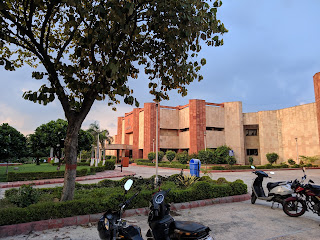NBPGR - NATIONAL BUREAU OF PLANT GENETIC RESOURCES
NBPGR is located at Pusa campus, New Delhi.
The ICAR scheme for ‘Plant Introduction’ commenced functioning in 1946 in the then Botany Division of IARI under the leadership of the Late Dr. Harbhajan Singh as the first ‘Operational Scientist’.
The unit was further expanded and strengthened as ‘Plant Introduction and Exploration Organization’ in the Botany Division in 1956, and later developed as a separate ‘Division of Plant Introduction’ in IARI in 1961.
Subsequently, on the recommendations of the ‘High Level Committee’ constituted by the Government of India in 1970, the ‘Division of Plant Introduction’ was upgraded to an independent institute ‘National Bureau of Plant Introduction’ in August 1976 which was rechristened as ‘National Bureau of Plant Genetic Resources’ (NBPGR) in January 1977.
The establishment of the Bureau coincided with the advent of the Green Revolution and was in response to the realization of perceived effects of the Green Revolution on agro-biodiversity. Further, it was in accordance with the international developments in the form of establishment of the International Board for Plant Genetic Resources (IBPGR), Rome, in 1974 (now renamed as International Plant Genetic Resources Institute).
The NBPGR played a pivotal role in the improvement of various crop plants and diversification and development of agriculture in India through germplasm introduction from various institutes/organizations located in foreign countries and germplasm collection from within the country and abroad and conservation thereof.
The Bureau draws guidelines from the Crop Science Division of ICAR, Institute Management Committee, Research Advisory Committee, Institute Research Council and Germplasm Advisory Committees.
The Bureau has five Divisions, three units and an experimental farm at its Headquarters in New Delhi and 10 Regional Stations located in different phyto-geographical zones of the country.
Besides, an All India Coordinated Research Network Project on Under-utilized crops are located in the Bureau.
The 10 regional stations are :
Regional Stations
1. Shimla (Himachal Pradesh): Established in 1960 at Phagli, Shimla. The mandate of the station is the collection, evaluation, characterization and maintenance of temperate crops.
2. Jodhpur (Rajasthan): Established in 1965, in the CAZRI Campus. Undertakes exploration, evaluation and seed increase for agri-horticultural crops of arid, semi-arid zones.
3. Thrissur (Kerala): Established in 1977. Responsible for collection and evaluation of germplasm of southern peninsular region with particular emphasis on spices and plantation crops.
4. Akola (Maharashtra): Established in 1977. Responsible for exploring Maharashtra, Karnataka, Goa, Daman and Diu for germplasm collections. It also undertakes evaluation and maintenance of crops suited to Central India and Deccan Plateau.
5. Shillong (Meghalaya): Established in 1978. Involved in collection and evaluation of agri-horticultural germplasm of north-eastern region including Sikkim and parts of northern Bengal.
6. Bhowali (Uttarakhand): Established in 1985. Responsible for exploration, characterization, evaluation and multiplication of agri-horticultural crops, of sub-tropical and sub-temperate regions.
7. Cuttack (Orissa): Established in 1985 in CRRI Campus. The mandate is exploration of agri-horticultural crops of eastern peninsular region with main emphasis on rice germplasm.
8. Hyderabad (Andhra Pradesh): Established in 1985. Engaged in speedy repatriation of pest and pathogen-free material as well as quarantine clearance of germplasm. Undertakes exploration, evaluation and seed increase for agri-horticultural crops of Andhra Pradesh and adjoining areas.
9. Ranchi (Jharkhand): Established in 1988. A centre for evaluation and maintenance of germplasm of tropical fruits and other field crops of Bihar, eastern Uttar Pradesh and West Bengal.
10. Srinagar (Jammu & Kashmir): Established in 1988. Responsible for exploration, collection and maintenance of agri-horticultural germplasm of temperate crops of Jammu and Kashmir region.







0 Comments